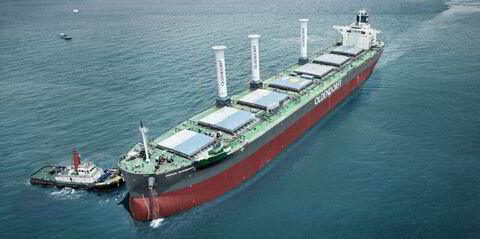ICBC Financial Leasing, one of the world’s largest ship financiers, has envisaged that its maritime transport portfolio will expand to $20bn within five years.
The leasing outfit of state giant Industrial and Commercial Bank of China (ICBC) is planning to continue its expansion pace in line with its corporate growth, according to Bill Guo, ICBC Leasing’s executive director in shipping.
“The portfolio [size that] we hope we can reach may be $20bn in three or five years, pending on global economy,” Guo told a Capital Link interview.
“We don’t want to set up a very aggressive target [and] we don’t want to set up a too small target.”
“The Chinese banks…do have capital to invest in some capital opportunities.”
ICBC Leasing currently has a $12bn portfolio of about 300 vessels, of which boxships and bulkers make up for almost half and LNG carriers account for one-third.
With his company’s large size, Guo stressed that ICBC Leasing would not over-emphasise on any particular sector to avoid unforeseeable consequences.
“It really depends on what the market needs. We don’t really judge the market; we more or less follow what the market requires.”
However, he hinted that the LNG and cruise shipping sectors may have some opportunities.
“For the last three years, LNG demand is so strong, so we really put a lot of thoughts and efforts into the LNG market,” Guo said.
“[And] cruise shipping is actually right now becoming more popular in Asia.”
To fight climate change, 13 European and American banks have signed up for the Poseidon Principles committing to adjust their portfolios based on the IMO’s decarbonisation target, which is to reduce greenhouse emissions from international shipping by 50% from the 2008 level before 2050.
Guo confirmed to TradeWinds ICBC Leasing is still assessing whether to participate in the initiative.
“I am personally positive on this…there will be a chance for us when we understand more about the requirements,” Guo said.
Funding targets
With the ambitious expansion target and a limited staff size, Guo said his company would still see the top 10 or 20 players in each sector as its ideal clients.
“We don’t have the resources to check all the customers. That’s why we sometimes go for big or public customers,” he said.
ICBC Leasing tends to steer away from those owners who prefer single-ship deals as it is time-consuming to carry out due diligence on those transactions, according to Guo.
“They might not be our ideal customers. But still, we take time to welcome them if we have time,” he said.
In November, ICBC opened a representative office in Greece — the world’s largest ship-owning nation — as part of Beijing’s Belt and Road Initiative.
While ICBC Leasing has committed to working with its parent to serve Greek shipowners, Guo does not expect a sudden boost to ICBS’s ship finance business as a result of the new office.
“They need some people that understand the shipping finance market very well,” he said.






